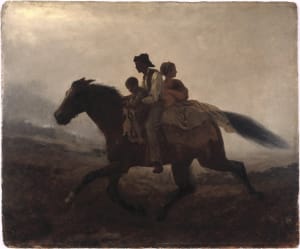Undergrounds Before Rail: Escaping Slavery, Claiming Liberty
Thursday, Nov 07, 2024 6:00p -
7:30p
Where:
Boston Public Library
Central Library in Copley Square
Boston, MA 02117
Admission:
FREE
Categories:
History, Lectures & Conferences, Rainy Day Ideas, Social Good
Event website:
https://bpl.bibliocommons.com/events/66cf4114442e073d00973cd4
Award-winning historian Margaret Newell tells the stories of Native and Black people escaping slavery, and the people who helped them
Freedom was not a concept just for white male Puritans. The right to consent to governance, the right to liberties, equal treatment under law – these were claimed by enslaved people in the only way they could – by escaping. Award-winning historian Margaret Newell, joined by Slave Legacy History Coalition co-founder Egypt Lloyd, explores the network of Indigenous and Black people helping enslaved individuals to escape – the stories of those who fled. This is a rarely revealed story of resistance to tyranny, juxtaposed to Puritan rights and freedoms.
Most Americans are familiar with the history of the 19th century Underground Railroad. Formerly enslaved people wrote autobiographies and newspapers published escape accounts, and later historians interviewed participants. We know much less about the experience of Native Americans and Africans who attempted to escape the tyranny of slavery in the colonial era, whose stories often only appear as testimony in courts or in runaway advertisements.
Frederick Douglass and other 19th century fugitives escaped via stagecoach, train, and steamship to the North. There, they entered thriving African American communities who assisted them. In a time before toll roads, transit, and diverse urban centers, how did people escape, where did they go, what networks existed to help them, and what challenges did they confront in maintaining freedom? What did freedom mean in an era where no free soil existed, when the bonds of slavery were being tightened by colonial administrations at the behest of slaveholders? The treaty that ended the first major Anglo-Indigenous conflict, the 1637 Pequot War, included a fugitive slave clause. As colonial cities and transportation networks grew, so did newspaper runaway ads, pass requirements, and policing of people of color.
Professor Newell will share the stories of Native Americans and African Americans who tried to claim their liberty and the people who helped them, 1620-1750, with respondent Egypt Lloyd.
Many of the escapees tried to head home, whether that meant to Pequot, Wampanoag and Narragansett reserves, or La Florida, or even Africa. Some traversed the Atlantic Ocean. Others focused on physical mobility and maintaining family and marriage ties through temporary absence. Still others organized mass escapes that resembled slave uprisings. Meanwhile, communities and individuals shared successful strategies for fighting slavery’s tyranny. They aided fugitives at enormous risk to themselves.
-

Sponsored -

Sponsored¡Miércoles Maravilloso!: free in-person Spanish convo practice
Wednesday, Mar 12, 2025 7:15p
Boston Area Spanish Exchange (BASE)
-

Sponsored -

Sponsored

